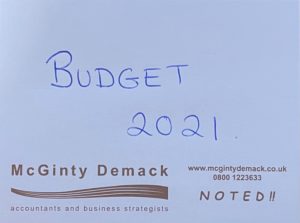Budget 2021 the Main Points
The Chancellor Rishi Sunak delivered his second Budget earlier this afternoon, setting out his three-point plan to protect jobs and livelihoods, fix the public finances and build the future economy. With the largest debt since the World Wars how he plans the country’s finances is key to the countries recovery.
Tax thresholds and allowances have been frozen, he however delayed any major tax changes probably to see how the economy and business responds once COVID restrictions start to be lifted.
The key tax measure announcements include:
- Personal tax thresholds are frozen until 2022. Increases are promised in 2022, with a further freeze until 2026.
- From 2023 the Corporation Tax rate will increase to 25%. The current rate of 19% will continue to apply to small businesses with profits of £50k or less. A tapered rate will apply to companies with profits of between £50k and £250k.
- Companies will be able to carry back losses for three years, to secure repayment of tax paid in prior years.
- A super-deduction (Capital Allowance) for business investment at 130% of costs, for companies, will apply for two years.
- The nil rate band for Inheritance Tax, the Lifetime Limit and Annual Allowances for pensions, and the VAT registration threshold are all frozen.
- The Coronavirus Job Retention Scheme (furlough scheme) is extended to the end of September, with a 10% contribution from employers for July and August, and 20% for September. Employees will continue to receive 80% of salary for unworked hours.
- Self-Employed Support Scheme extended, with grants 4 and 5. The newly self-employed who have submitted 2019-20 tax returns can apply. An 80% grant continues to apply where profits are reduced by 30% or more. A 30% grant will apply where profits are reduced by less than 30%.
- Stamp Duty Land Tax (SDLT): the £500k nil rate band is extended to 30 June. A £250k nil rate band will then apply until 30 September.
- The 5% rate of VAT for the tourism and hospitality sectors is extended to 30 June. An interim rate of 12.5% will then apply until April 2022.
- New restart grants of £6k for non-essential retail businesses and £18k for hospitality businesses will be available from April.
- Business rates holiday for the retail, hospitality and tourism sectors is extended to 30 June. A two-thirds discount will then apply for the rest of 2021/22.
- Investment in HMRC to tackle COVID-19 support fraud and tax avoidance.
For more details or advice on how the changes affect you please get in touch 01942 322767 or info@mcgintydemack.co.uk




